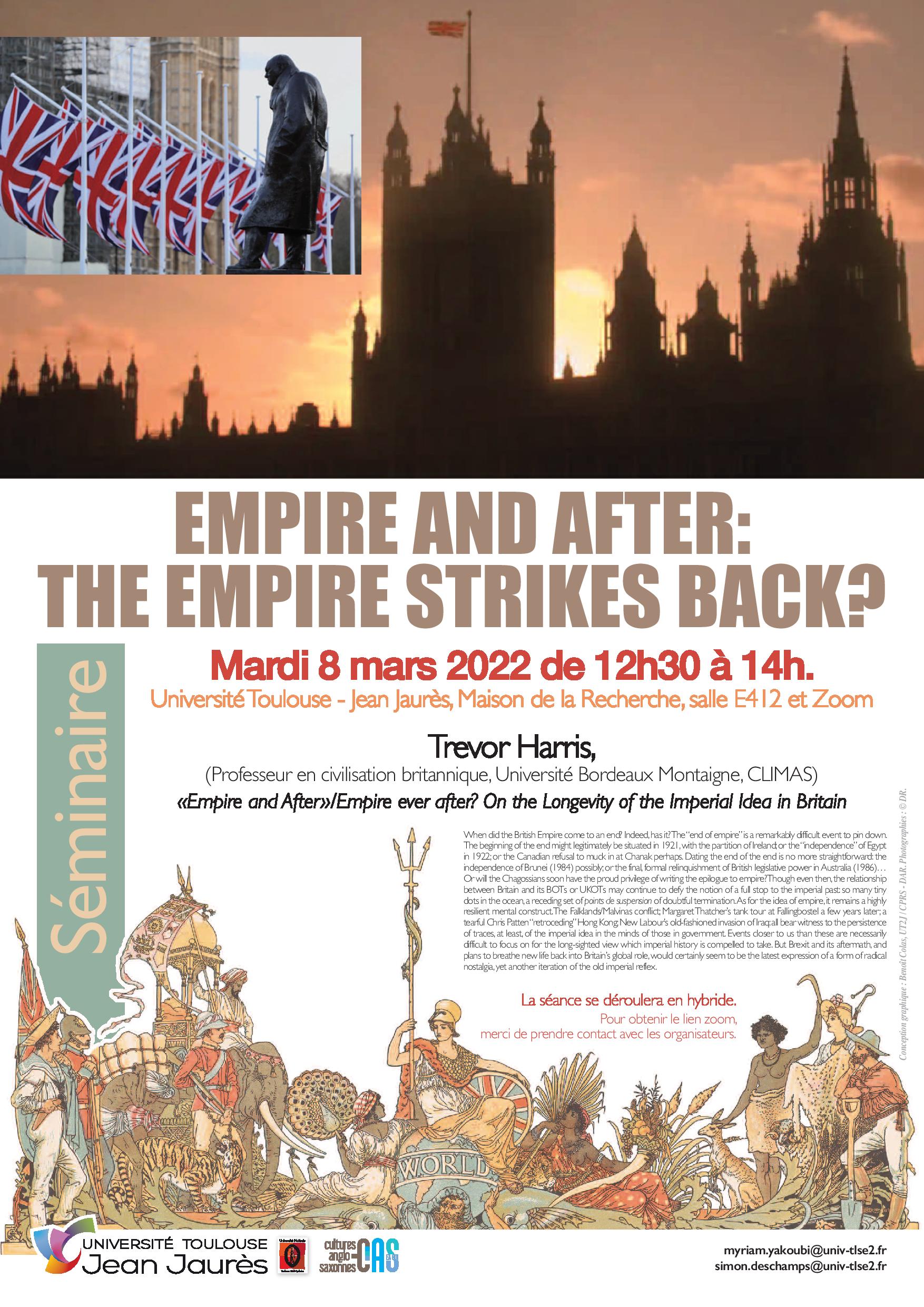-
Partager cette page
Séminaire "Empire and After" - "Empire ever after? On the Longevity of the Imperial Idea in Britain"
Publié le 18 février 2022 – Mis à jour le 18 février 2022
le 8 mars 2022
12h30-14h
UT2J, MDR, Salle E412 / En ligne
Séminaire de Trevor Harris (Professeur en civilisation britannique, Université Bordeaux Montaigne, CLIMAS)
When did the British Empire come to an end? Indeed, has it? The “end of empire” is a remarkably difficult event to pin down. The beginning of the end might legitimately be situated in 1921, with the partition of Ireland; or the “independence” of Egypt in 1922; or the Canadian refusal to muck in at Chanak perhaps. Dating the end of the end is no more straightforward: the independence of Brunei (1984) possibly; or the final, formal relinquishment of British legislative power in Australia (1986)… Or will the Chagossians soon have the proud privilege of writing the epilogue to empire? Though even then, the relationship between Britain and its BOTs or UKOTs may continue to defy the notion of a full stop to the imperial past: so many tiny dots in the ocean, a receding set of points de suspension of doubtful termination. As for the idea of empire, it remains a highly resilient mental construct. The Falklands/Malvinas conflict; Margaret Thatcher’s tank tour at Fallingbostel a few years later; a tearful Chris Patten “retroceding” Hong Kong; New Labour’s old-fashioned invasion of Iraq: all bear witness to the persistence of traces, at least, of the imperial idea in the minds of those in government. Events closer to us than these are necessarily difficult to focus on for the long-sighted view which imperial history is compelled to take. But Brexit and its aftermath, and plans to breathe new life back into Britain’s global role, would certainly seem to be the latest expression of a form of radical nostalgia, yet another iteration of the old imperial reflex.
La séance se déroulera en hybride. Pour obtenir le lien zoom, merci de prendre contact avec les organisateurs.
Séminaire "Empire and after"
When did the British Empire come to an end? Indeed, has it? The “end of empire” is a remarkably difficult event to pin down. The beginning of the end might legitimately be situated in 1921, with the partition of Ireland; or the “independence” of Egypt in 1922; or the Canadian refusal to muck in at Chanak perhaps. Dating the end of the end is no more straightforward: the independence of Brunei (1984) possibly; or the final, formal relinquishment of British legislative power in Australia (1986)… Or will the Chagossians soon have the proud privilege of writing the epilogue to empire? Though even then, the relationship between Britain and its BOTs or UKOTs may continue to defy the notion of a full stop to the imperial past: so many tiny dots in the ocean, a receding set of points de suspension of doubtful termination. As for the idea of empire, it remains a highly resilient mental construct. The Falklands/Malvinas conflict; Margaret Thatcher’s tank tour at Fallingbostel a few years later; a tearful Chris Patten “retroceding” Hong Kong; New Labour’s old-fashioned invasion of Iraq: all bear witness to the persistence of traces, at least, of the imperial idea in the minds of those in government. Events closer to us than these are necessarily difficult to focus on for the long-sighted view which imperial history is compelled to take. But Brexit and its aftermath, and plans to breathe new life back into Britain’s global role, would certainly seem to be the latest expression of a form of radical nostalgia, yet another iteration of the old imperial reflex.
La séance se déroulera en hybride. Pour obtenir le lien zoom, merci de prendre contact avec les organisateurs.
Séminaire "Empire and after"

